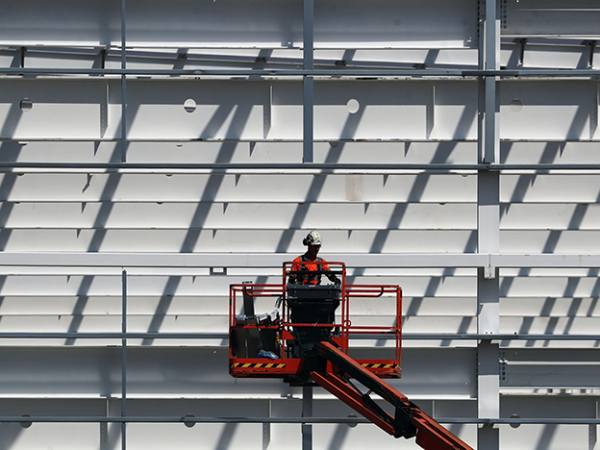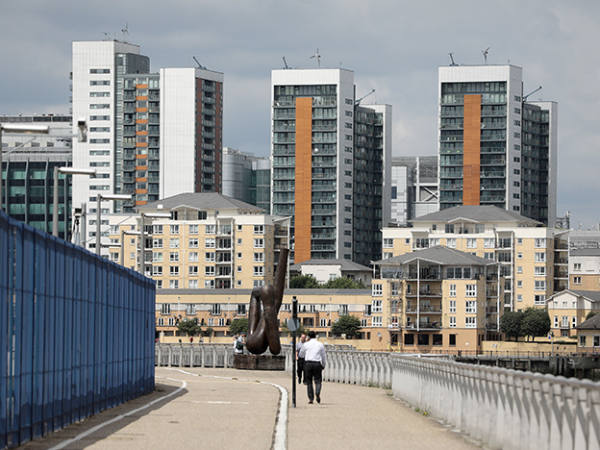- Listed retail landlords feeling confident again
- Councils and private equity buying up centres
Castlegate Shopping Centre in north-east England is the “heart of Stockton”. That's according to the signs on the largely vacant building, at least. Stretching from the start of the high street to the middle of it, this once vital organ in the local economy has been in a critical condition for some time. Nearly half the shops were empty as of March last year, prompting the council to suggest some pretty radical surgery: remove the shopping centre and replace it with a park.
On my visit to Stockton-on-Tees, two councillors insist that this 'heart' has in reality held the town back more than anything else. The mid-century building gives the town far more retail units than it could possibly need. It also completely obscures the river which, were the shopping centre not there, you’d be able to see from an outside table at one of the myriad of pubs and bars on the high street.
Knocking down a shopping centre and replacing it with a park may seem extreme, but the current situation for such properties across the country is desperate. According to data from property agency Lambert Smith Hampton (LSH), shopping centres sold for 58 per cent less than their purchase price over the last two years on average – with some centres selling for 90 per cent less. The rock bottom pricing is even worse than it appears on paper when inflation is factored in, with some of those assets having been originally bought over a decade ago.
This leaves the likes of British Land (BLND), Land Securities (LAND), Capital & Regional (CAL), NewRiver Reit (NRR) and Hammerson (HMSO) with some tough choices to make. Selling shopping centre assets in such a deflated market is not so much cutting your losses as it is breaking your legs on the way to the fire exit, yet it is a decision many have made anyway. The only other option is to plough on – either through a radical reinvention plan such as the one espoused by Stockton council or, in a countercyclical move that carries a big slice of risk, buy up more shopping centres in the hope the market has bottomed.
There are signs that this may have happened. According to LSH, the total value of UK shopping centre investment reached an absolute low at the end of 2020, but it has started to climb back since. Many of these early-cycle buyers have been private equity firms with players such as Signal Capital Partners, Redical Holdings and LCP being particularly active.
Yet, while private equity tends to be willing to take on more risk than its listed counterparts, not all publicly traded businesses are so timid. In December last year, Landsec opted to increase its stake in the Bluewater Shopping Centre in Kent for a knockdown price. Some calculated that it paid less than a third of what the stake would have been worth back in 2014. Meanwhile, NewRiver chief executive Alan Lockhart says the landlord would not rule out buying another shopping centre.
“If we see a great opportunity within the shopping centre sector that can either deliver very stable resilient cash flows with the opportunity to deliver some capital growth, then absolutely we would certainly look at those opportunities,” he says.
There are two big caveats to this revival in investment activity, however. The first is that shopping centre values may not have finished falling. That's the opinion of Capital & Regional chief executive Lawrence Hutchings, who predicts that shopping centre prices in some regions will continue to drop, describing it as a “very uneven landscape”. One landlord points to Middleborough as a place which has too many shopping centres, whose value will continue to fall without some sort of radical intervention.
The second caveat is the role of local authorities such as Stockton. According to LSH, they represented around a third of all shopping centre deals in 2020, though that figure has fallen to around 15 per cent for the first half of 2022. Either way, while some investment has undoubtedly been driven by players who see value in shopping centre assets at rock bottom prices, a big chunk of it is being driven by local authorities who are only buying the assets because they feel they have no other option.
Even though local authorities’ motivations are very different to private players, there is still a lot private companies can learn from Stockton’s example. Less than five-minutes walk up the road from Castlegate is Wellington Shopping Centre, an outdoor retail district which the council has also acquired and which is much more modern than its downtown counterpart. It is also much busier, with the council putting its vacancy rate at 13 per cent.
Why the big difference? In part, Wellington is a nicer space to be in. It is a fully pedestrianised area sandwiched between the Globe Theatre – which has hosted The Beatles, The Rolling Stones and, as the council takes great pride in pointing out, Tom Jones's first professional gig – and the town centre’s fountains. The area attracts families, pensioners and buskers alike.
However, the real magic here is supply and demand. With Castlegate gone, or with the tenants aware that it will go, many have moved across to Wellington. The council predicts that once all the former Castlegate tenants come over and a few other deals go through, Wellington will have a vacancy rate of just 4 per cent. The town’s overall vacancy rate has also improved. In March 2021, LSH put the town’s retail rate at 34 per cent; the council is confident that this will drop to 10 per cent by the end of 2022.
In Castlegate, I met one tenant who was set to move over the very next day. The sign of their new shop is already up in the Wellington centre, but trade is still brisk in Castlegate despite the emptiness of the space as a whole. Evidently, the people of Stockton still want physical shops, and this appears to be the case across the rest of the UK as well. LSH data shows that average shopping centre vacancy reached a peak of 19.4 per cent in the middle of 2021 and has since dipped to 19 per cent. That small fall will have been driven by landlords stomaching less rent than before, but the plateau is nevertheless a sign that there is at least some demand for shopping centre units.
One obvious reason for this is that the end of lockdowns and Covid restrictions in the UK has seen people return to town centres. While the high street recovery has been stuttered by the looming threat of another recession and the uncertainty around returning to the office, the existential rather than cyclical threat to shopping centres seems to have passed and online shopping penetration looks likely to have peaked for the foreseeable future. Pre-pandemic, online shopping accounted for 19.1 per cent of all retail transactions in the UK, according to the Office for National Statistics. Thanks to three lockdowns, that figure rocketed up to 37.8 per cent by January 2021, but it has been falling sharply for every month since November last year, hitting 24.8 per cent as of this June.
While it is unlikely that listed shopping centre landlords will be willing to knock down their own buildings in favour of a public park, there are some things they can do. They could, for example, team up with local authorities to share the risk and the rewards of radical plans. The Stockton councillors tell me they would have gladly worked with a private company if someone had been willing to partner with them. As it was, they used their own funds – a decision which can often be controversial with local taxpayers.
Another option is renovation rather than demolition. Private equity firm Redevco bought Templars Square in Oxford from NewRiver late last year for £38.8mn, and plans to turn it into a mostly residential development with a handful of other commercial uses. LSH calculates that 37 per cent of all shopping centre deals over the last two years were done with change-of-use redevelopment plays in mind. But NewRiver’s Lockhart points out that change of use to residential is harder to make profit from in the north of the country where house prices are lower.
Even though the choices available are not ideal, shopping centre landlords have better options now than they did even one year ago. With vacancy trending down (slightly) and investment activity trending up, the outlook is improving. As Capital & Regional’s Lawrence Hutchings puts it, “it makes me want to do my shoelaces in the morning”.













